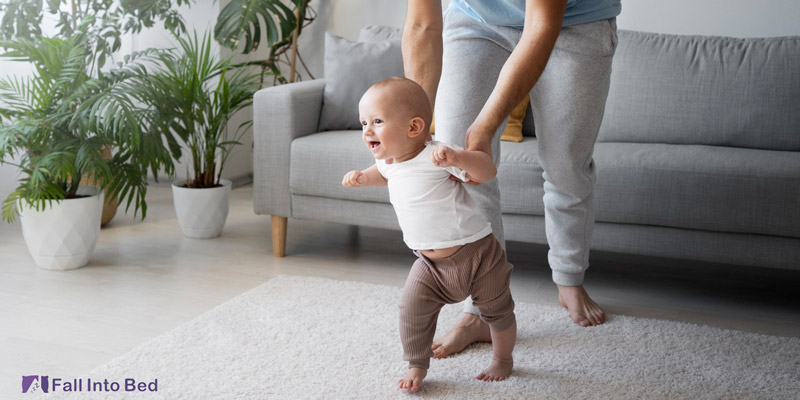One of the most challenging things for parents is putting their baby to sleep. And just when they feel like they’re getting a hang of things, their child’s sleep patterns change again! Navigating sleep and developmental milestones can be pretty overwhelming with each stage bringing new challenges and adjustments. Understanding these milestones can help parents in this journey.
In this article, we’ll explore how sleep patterns shift as babies grow and offer practical tips for managing these transitions smoothly.
Developmental Milestones that Lead to Baby Sleep Disruptions
During the first two years of your baby’s life, they try to learn essential skills like walking, talking and so on. These transitions to learning these skills are called developmental milestones.
Every baby has their own timeline when it comes to milestones, though most of them happen around the same time as everyone. To understand these developmental stages, we divide them into two groups:
We have PHYSICAL milestones, such as:
- Rolling over
- Sitting up
- Crawling
- Standing
- Walking
And, some common COGNITIVE milestones are:
- Changes in sleep cycles
- Separation anxiety
- Language bursts
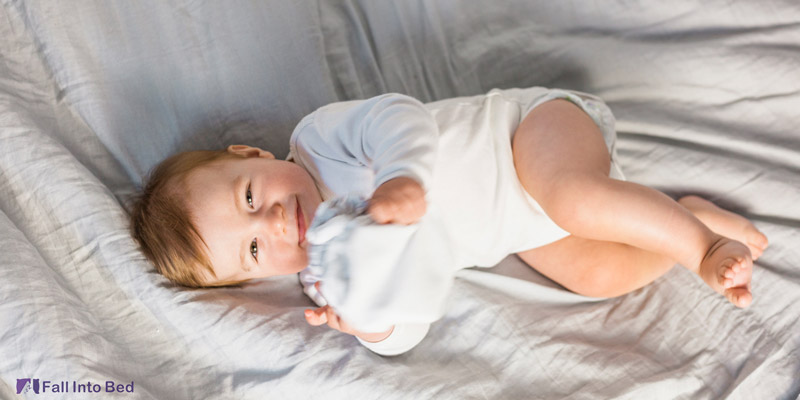
How Physical milestones affect your baby’s sleep
Rolling over (3-5months)
It’s comforting for parents to know that when they put their new-born down, they won’t go anywhere. But that doesn’t stay for long. As babies begin to learn rolling over, their sleep patterns can change significantly.
Once they discover this new skill, they may start rolling during sleep, which can disrupt their rest and potentially lead to more frequent awakenings. This new mobility can be both exciting and challenging, as parents may need to adjust sleep environments and routines to ensure their baby’s safety and comfort.
Creating a safe sleep space and encouraging consistent sleep habits can help manage these changes and support better sleep for both the baby and the parents.
Introduction to solid (6-7months)
Another one of these developmental milestones that can potentially affect sleep is a change in your baby’s diet. As babies start to explore new foods, their digestive systems are working harder to process these solids, which can affect their sleep patterns. Initially, there might be some disruptions as their bodies adjust to new textures and flavors, leading to potential discomfort or gas that can interrupt their rest.
However, as they become accustomed to eating solids, many parents find that their baby’s sleep improves. A balanced diet with solids can lead to greater satiety, helping the baby to sleep more soundly through the night. The key is to introduce solids gradually and monitor how different foods affect your baby’s sleep, ensuring a smoother transition to this new phase in their development.
Sitting up and crawling (6-7months to 10months)
When babies start sitting up and crawling, it’s a mix of excitement and new challenges. Sitting up is a big win for parents, but it can also affect nap time and bedtime, because babies might start practicing this new skill during their sleep. They might sit up and have trouble getting back down comfortably, which can lead to more restless nights. Adding crawling into the mix, and you’ve got a whole new ballgame.
Some new-borns sleep with their butt in the air as it reminds them of the position they had in the womb. Sleeping in this position strengthen their legs and hips, and prepare them for the milestone of crawling and walking.
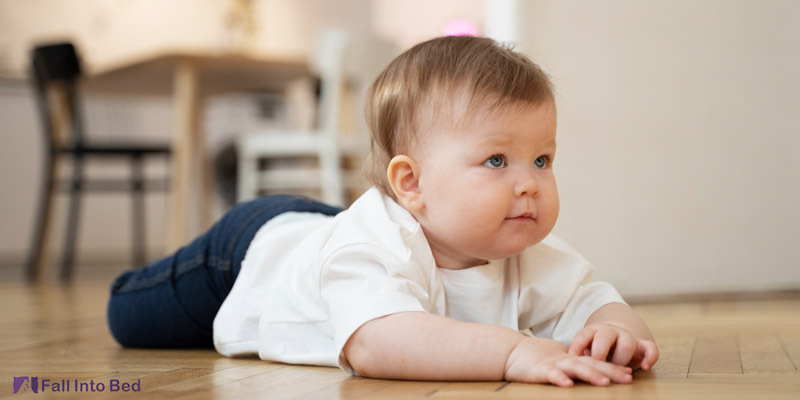
Crawling brings tons of energy and curiosity, which can make winding down even trickier. To help with this, keeping a safe, comfy sleep environment and sticking to a calming bedtime routine, like reading or gentle rocking, can make a big difference. It’s all about finding a balance and making bedtime a cozy, predictable part of the day. There also some amazing sleep tricks to out your baby to sleep in less than a minute!
Teething (6months to 18months)
Teething is a milestone that often brings both excitement and discomfort. As new teeth emerge, babies may experience soreness and irritability that can disrupt their sleep. The pain associated with teething can affect sleep and lead to more frequent awakenings and difficulty falling back asleep.
To help alleviate these disruptions, parents can use teething rings, gently rub the baby’s gums, or offer appropriate pain relief as recommended by their pediatrician. Teething blankets and crib guards can also be helpful during sleep.
Maintaining a consistent and soothing bedtime routine, along with ensuring a comfortable sleep environment, can also help support better sleep during this challenging phase.
Walking (12-15months)
The transition from crawling to walking is a major milestone that can bring about both joy and challenges. As babies learn to walk, their increased mobility can lead to changes in their sleep habits. They might practice walking during the night or early morning hours, which can lead to disrupted sleep and more frequent wake-ups.
Parents can support their child through this transition by providing a consistent sleep environment and ensuring that the baby’s room is safe for exploratory movements. Encouraging a relaxing pre-sleep routine and addressing any potential sleep disruptions promptly can help maintain better sleep patterns during this exciting phase of development.
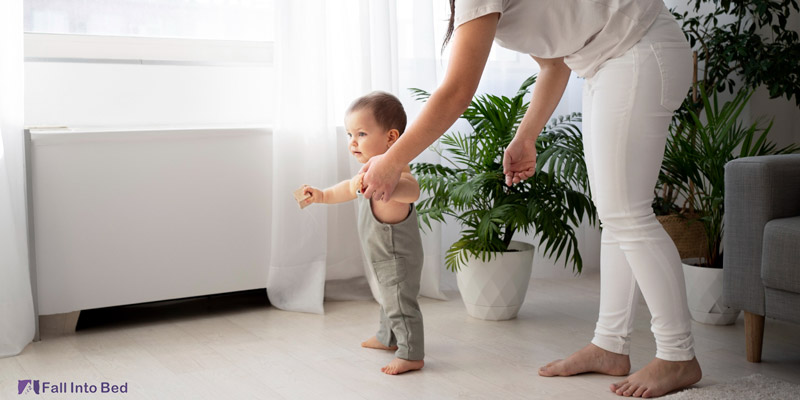
Crib to bed transition (18months+)
The transition from a crib to a bed marks a significant change in a child’s sleep environment. On one hand, moving to a bed provides a sense of independence and ownership over their sleep space, which can positively impact their confidence and comfort.
On the other hand, this transition may lead to a period of disrupted sleep as the child adjusts to the new boundaries and freedom of a bed. They might be more inclined to get out of bed or have difficulty settling down in their new setup. While the adjustment period can involve some sleepless nights and increased bedtime resistance, with time and consistency, most children adapt to their new bed and develop a stable, restful sleep routine. Also the sleep position your baby sleeps in, is very important. Especially if they are younger than 12 months.
Some babies not only refuse to sleep in a bed, but also don’t sleep in their crib. This can be due to a lot of reasons. One of them is that your baby might have gotten used to falling asleep in your arms. And the moment you put them down, they wake up.
How cognitive milestones affect your baby’s sleep
Talking (9months+)
One of the most fun developmental milestones that can impact sleep is when your little one starts talking. As babies begin to talk, they enter a new phase of communication and interaction. This stage can influence sleep in a few ways. Babbling typically starts around 4 to 6 months, when babies produce repetitive consonant-vowel sounds like “ba-ba” or “da-da.” By 10 to 14 months, many babies begin to say their first meaningful words, such as “mama” or “dada.” Around 15 to 18 months, they start combining words into simple phrases like “want cookie,” and by 18 to 24 months, they form simple sentences like “I see car” or “mommy help”.
As they hit these stages, they may become more vocal during bedtime, which can lead to increased awakenings or difficulty falling asleep. Parents can help manage this by establishing a calming bedtime routine that includes quiet activities, such as reading or singing softly. Creating a soothing environment and reinforcing sleep associations with consistent routines can help ease the transition and support a more restful night’s sleep.
Separation anxiety (6-12months to 2years)
Separation anxiety is a common phase for little ones, usually kicking in between 6 and 12 months of age. It’s when babies start to feel upset or anxious when they’re apart from their favorite grown-ups. This can be a tough time, with lots of tears and clinging, but it’s a normal part of their emotional growth.
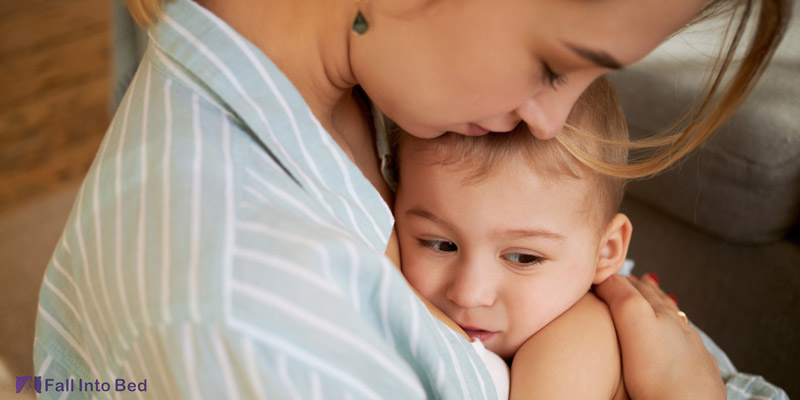
It often peaks between 9 to 18 months. But the good news is that it generally eases up by the time they’re around 2 to 3 years old, as they start to understand that their caregivers will always come back. While it can be challenging, sticking to consistent routines, practicing short separations, and offering lots of reassurance can make this phase a bit smoother for both kids and parents.
Changes in sleep cycles
As your baby grows, their sleep patterns naturally change. When they’re new-borns, they tend to nap frequently throughout the day and night. But as they hit around 4 to 6 months, you might notice they start sleeping for longer stretches at night and taking fewer naps.
Sometimes, this shift can come with a few hiccups, like sleep regressions where they might wake up more often or have trouble falling back to sleep. This can mostly happen at around 10 months,14 months and 15 months. And it happens due to various reasons. These changes are totally normal and usually short-lived. Keeping a consistent bedtime routine and being patient can help both you and your baby adjust to the new sleep rhythms
Tips to help your child sleep during different developmental milestones
As we mentioned, The most important thing is to keep a consistent bedtime routine, so that you can minimize the changes of each milestone.
Another great step you can take, is to practice these new skill with your baby during the day. This way the excitement of trying these skills does not follow them in bed to affect their sleep.
Overall, developmental milestones are a huge part of your child’s growth and though it might be difficult to endure this time, you can be sure that the result is going to amaze you when you see your little one walking!

